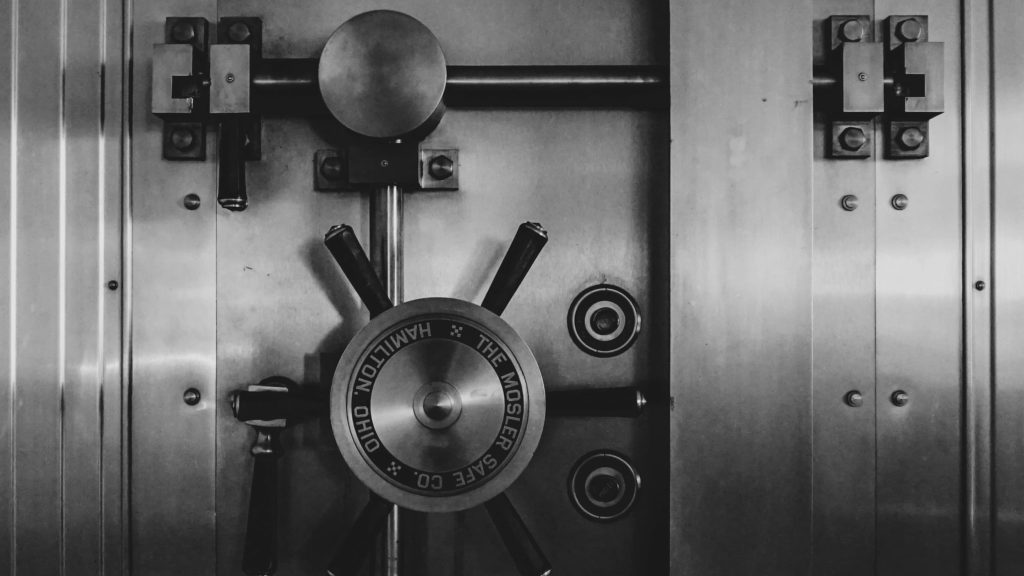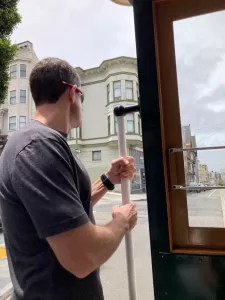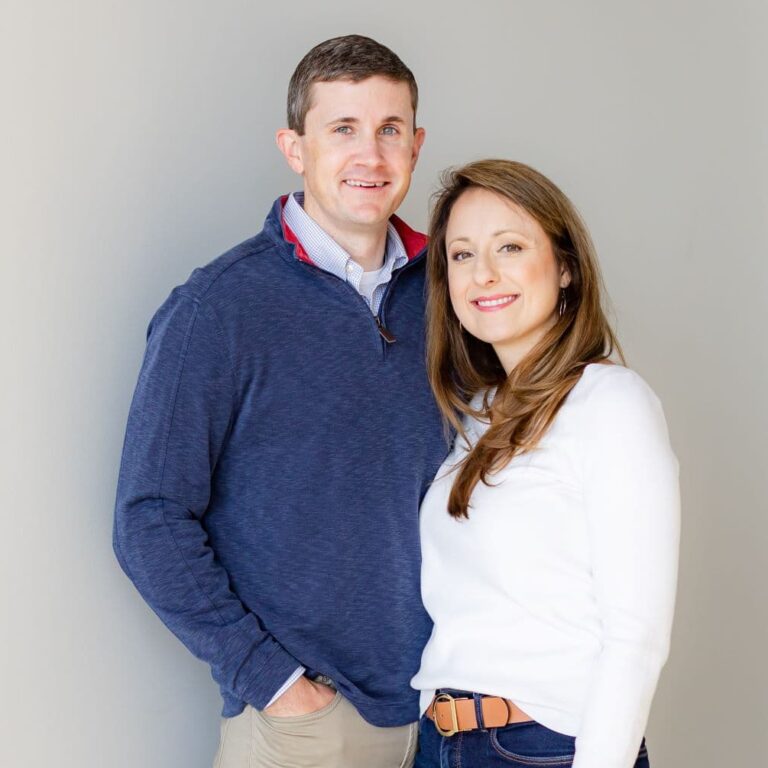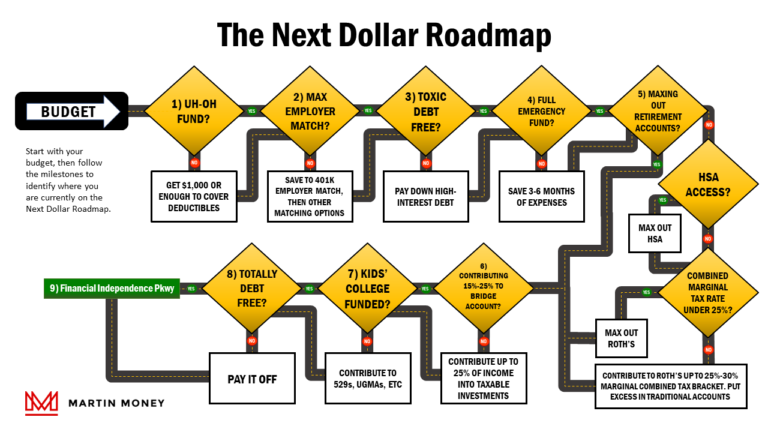Milestone 4: Fully Funded Emergency Fund
Now that you’re beyond Milestone 3 and have your toxic debt paid off, it’s time to move on to Milestone 4, the fully funded emergency fund.
- Starting Point: Creating Your First Budget
- Milestone 1: The Uh-Oh Fund
- Milestone 2: Take Advantage of Your Employer Match
- Milestone 3: Pay Off Toxic Debt
- Milestone 4: Fully Funded Emergency Fund
- Milestone 5: Save 15%-25% of Your Income in Tax-Advantaged Retirement Accounts
- Milestone 6: Save for Flexibility in Bridge Accounts
- Milestone 7: Prefund Kids’ Expenses
- Milestone 8: Pay Off Remaining Debt
- Milestone 9: Total Financial Independence
In November 2015, I got laid off. My company was struggling and I was among those first encouraged to seek other opportunities.
You can imagine my joy in being part of this select few.
I remember gathering my things, saying goodbyes, and calling my wife to tell her the bad news on my way home at 11:00 in the morning. We knew things hadn’t been going well at my office, but were still a bit shocked at the sudden end.
Being the caring person she is, she asked “well, how do you feel?”
I hadn’t really thought about it yet, but I did a quick emotional self-appraisal.
Sad. I was sad. I think that’s the best way to put it.
My sadness probably isn’t a shocking revelation, but what’s interesting is why I was sad.
I felt a deep sense of rejection. I felt like my work product was somehow inferior to others and maybe that’s why I got the axe. I had some good friends at that company, but I wasn’t a part of the team anymore.
Oddly enough, I wasn’t really worried about money. I knew I’d need to eventually find another gig, but at that moment I had very little anxiety about mortgage payments or bills because we had made arrangements for a rainy day like this one.
We had an emergency fund of somewhere in the neighborhood of 3-4 months’ worth of expenses at the time. Truthfully, we may have been able to stretch it a bit further if we needed, but I didn’t have to worry about money all that much.
That peace of mind was priceless because there are a lot of things you think about when you suddenly find yourself without an income.
I knew worrying about how we’d pay bills, keep the mortgage current, and simply put food on the table would have only hindered my ability to focus on finding the next stop on my career journey.
We should all have an emergency fund for life’s unexpected storms. Having a large pool of cash to tap into will help you weather emergencies with a higher degree of control and comfort.
Other Risks
Possibly losing your working income isn’t the only reason you need an emergency fund. Other potential risks include:
- Illness of you or a loved one, requiring an extended time away from work;
- An unexpected and expensive home repair like an air conditioner or new roof;
- Medical bills from illness or injury;
- Extensive car repairs or replacement;
- A pandemic.
And these are just the ones I could come up with off the top of my head. There isn’t a limit to the number of unexpected issues that might come along.
How much should I Save?
Like many financial questions, the answer depends on the circumstances of your unique situation. There are a lot of variables that can push the needle in completely different directions.
This post is really going to serve as a guide more than provide you with a hard and fast number you need to reach.
To begin with, you’ll need to know how much money you need; which means you need to know how much you spend; which means you need to do a budget.
You can take look back at our post about budgeting here.
The widely accepted rule of thumb for a full emergency fund is 3-6 months of expenses. This is actually a pretty broad range. I’d recommend tuning your actual emergency fund amount based on some of the following considerations.
You’re probably safe on the smaller (3-4 month) end of the range if:
- You have a very secure job like a teacher with tenure
- You’re in good health
- You don’t have much or any debt
- You have more than one income stream
- You share finances with someone else that’s working
- It would be easy for you to find another similar job if you lose the one you have
- Your car is in good mechanical shape
- You’re renting and can find a cheaper place to live quickly
- You don’t have anyone else depending on your income
- You have significant Roth contributions that you could access if you had to
Lean toward the 6-month end of the spectrum if:
- Your job isn’t secure
- Your health is poor
- You have significant debt
- You only have one source of income
- It could take several months to find another job
- You’re driving a beater
- You have dependents
- You own a home
If you have a very unique or specialized job that may require relocation or an extended time to replace, you should probably save over 6 months of expenses.
I’d also save over 6 months if you have a very high income and an even larger emergency fund if you’re approaching retirement.
Other Safeguards Against Income Loss
There are other things you can do to protect yourself in addition to just hoarding cash.
Multiple income streams
Just like you can and should diversify your investment portfolio, having multiple sources of income can be an excellent safeguard for your finances.
There are lots of possibilities here, but I’d recommend starting by trying to find a way to monetize a skillset or interest you already have.
For example, a friend of mine started doing freelance photography in his spare time because he already had a lot of really nice equipment and a natural interest in the subject.
After several years of photography on the side, he runs a very profitable, full-blown business in addition to his nine to fiver during the week.
Some alternative income ideas include: selling goods you make on Etsy, eBay arbitrage, self-publish a book, getting a weekend job, investing in rental property, and many others.
Build a unique skillset
Skills that are difficult to come by, but highly sought after are great for securing the job you have and improving your prospects should you need to move on.
I work with a lot of very technically skilled people in my day-to-day business. Part of my job there calls for me to evaluate different risks we have as an organization.
I frequently find that one of our biggest risks is the amount of technical knowledge that exists only in the minds of several of our key engineers.
These people are subject matter experts in very specific fields and invaluable to our company. We’d be in a serious bind without them and consequently, they are very valuable.
Be sure you take advantage of opportunities to hone, refine, or specialize your skillset when they present themselves.
This may require working out of your comfort zone for a bit or solving a challenging problem, but in the long run, it might make you a very tough person in your company to lose.
Know your disability/long-term care benefits
You may have benefits from your employer to back up your income in certain circumstances. These options are most often available due to a health-related income loss.
You are probably also covered by a government-sponsored unemployment insurance plan that both you and your employer have been contributing to during your working time.
Since you’ve been paying for it, you might as well apply for it during your unemployment. Just know that it’s probably not going to be very much money.
Reduce your debt
Another good way to reduce your emergency needs is to decrease the amount of debt you have to service during a low or no-income period. Obviously, it will be easier to get by if you have fewer bills to pay.
This is another reason we recommend paying off toxic debts in Milestone 3 of the Next Dollar Roadmap. It just gives you another level of flexibility when times get tough.
Where should I keep my emergency fund?
The question of where to place these funds is one we see a lot more often than we ever expected. Here are some key things to keep in mind about your emergency fund:
- Emergencies aren’t something you can time.
- You may need to be able to access emergency funds relatively quickly.
- You don’t want your emergency fund’s value to be exposed to possible fluctuations in asset prices.
- You don’t want to risk losing your emergency fund entirely.
Unfortunately, these requirements limit where we can responsibly store our emergency fund.
Real estate is not a good option because it can take a long time to liquidate and it’s subject to sudden changes in value which might mean you have to sell your investment at a loss.
Stocks, bonds, and mutual funds are also subject to sudden price fluctuations. While they don’t usually take as long as real estate to liquidate, it can still take several days for the sale of equities to settle so the money can be used.
Finally, don’t put it under your mattress. Your house could burn down, your dog may find it and eat it, you may forget about it, it might get stolen by the cleaning folks; there are lots of reasons this is less secure than a bank.
Ultimately, the investment options for your emergency funds aren’t really very exciting, but let’s take a look at some possibilities you may want to consider for pulling in a little interest without exposing yourself to unnecessary risks.
1) High-Yield Savings Account
We use the words “high-yield” loosely here. These accounts produce more interest than say typical savings accounts at your local bank, but it’s still nothing amazing.
You’ll likely find the best options for these accounts are with online banks. They can give a little extra in interest because they don’t have a lot of the overhead that brick & mortar banks are subject to.
One thing to watch out for on these accounts is introductory rates or rates that are designed to attract you to sign up, only to decrease later.
Some banks will even offer a cash incentive to sign up, but generally, you will be better off going with the option that has the longest history of paying out a solid interest rate.
Also, be sure to choose an account that is FDIC insured. Most of these are. The FDIC insures your account in case your bank fails.
You’ll receive $250,000 of coverage for the account owner and an additional $250,000 per co-owner. So, if you co-own an account (usually with a spouse) you’d have a total of $500,000 in coverage.
2) Money Market Accounts
Money Market Accounts technically come with an inherent risk of loss, but it is relatively low. Even if you do lose some money on these you aren’t likely to see much of a dip.
Brick & mortar banks typically have significant restrictions on how these accounts are used so be sure to get all the details when signing up.
Many times, online banks or investment companies have very flexible money market options.
Personally, the bulk of my emergency fund is in a money market account within my personal investment account at Vanguard.
It also serves as the settlement fund for my taxable investment account. I can transfer the funds to my checking account quickly if needed.
Money market accounts are usually FDIC-insured.
3) Certificates of Deposit (CDs)
CDs are an agreement you make with a bank to keep the deposited funds for a specified period of time. If you remove the money before the CD matures, you’ll have to forfeit the interest you’ve earned or may even have to pay a fee.
CDs don’t exactly provide much flexibility, so many times people will build a CD ladder with a variety of maturity dates to mitigate the risk that they’ll need the money earlier than expected.
Personally, I do not prefer to use CDs because they are just too restrictive and the interest rate you can earn isn’t attractive enough for me to consider it as an alternative.
4) Checking Accounts
You probably don’t need a lot of explanation here, but carrying a large checking balance does protect you somewhat from overdraft fees.
The downside is a higher risk of losing your money if someone manages to steal your debit card information.
You also may be more tempted to spend your emergency fund if it’s in the same pool as the money you use to cover normal expenses.
Checking accounts would not be my top choice for the reasons listed above, but mostly because there are clear options with better returns.
Our next post will cover Milestone 5 on our Next Dollar Roadmap: Maxing out your tax-advantaged accounts.







